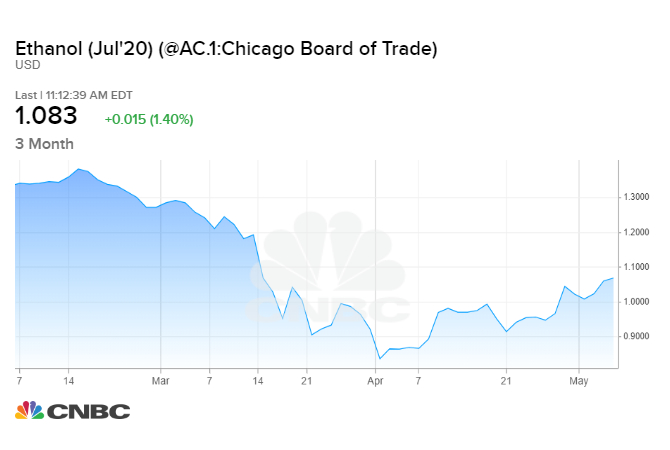Where gasoline goes, ethanol follows, and both have been on a path to unprofitability.
Ethanol prices have collapsed as gasoline demand dropped by half due to COVID-19 shutdowns. That because ethanol —a biofuel derived from corn — makes up about 10% of the gas in your tank.

Source: CNBC
So imagine you’re the guy right now who founded the world’s largest ethanol producing company. “We produce about two billion gallons of ethanol per year,” says Jeff Broin, founder and CEO of POET, based in Sioux Falls, South Dakota.
His company runs more than two dozen ethanol plants in the U.S., though currently three plants are closed, and 10% of his workforce is laid off.
“It’s down to about half capacity in a lot of plants,” he said.

The conversion from ethanol to hand sanitizer comes with “some pretty significant costs,” he says. The alcohol has to be further distilled to meet pharmaceutical grade standards, then it needs to be mixed with other ingredients to make hand sanitizer. “And then we take it to a bottling facility, which has not been something we’ve done in the past.”
The company is donating much of the hand sanitizer to front line healthcare workers near its headquarters, but it is also starting to sell some of the hand sanitizer online and in retail stores.
The new product helps offset losses in ethanol. Just as gasoline demand affects ethanol, ethanol production has had its own ripple effects. The government says 40% of the nation’s corn crop now goes into making the biofuel, and with less of it being produced, corn is even less profitable.
“Farmers were already oversupplied with grain, and this exacerbates issues on the farm,” Broin says.
Livestock producers often buy a high-protein feed which is a byproduct of the ethanol process. In a normal year, POET would produce and sell 10 billion pounds of that feed. Not this year. Beer and soda companies use the CO2 that is another byproduct, and so do meat packing plants which use carbon dioxide to flash freeze meat. Some are now concerned we may end up with a CO2 shortage.
However, gasoline demand is showing signs of a comeback, and ethanol futures are well off their lows from a month ago. Even so, Broin says POET is going to stay in the hand sanitizer business. He predicts it could eventually provide as much as 5% of income.
“I think the demand for hand sanitizer will increase over time,” he says. “People need to stay safe.”

